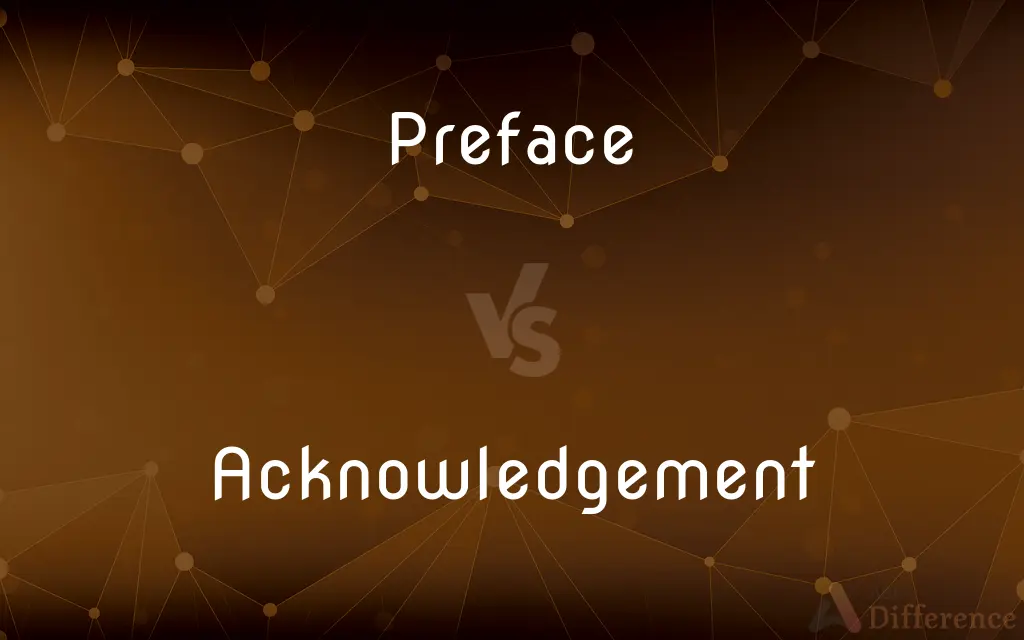Preface vs. Acknowledgement — What's the Difference?
By Tayyaba Rehman & Fiza Rafique — Updated on May 2, 2024
A preface introduces the themes and purpose of a book, written by the author; an acknowledgement thanks those who contributed to the creation of the work.

Difference Between Preface and Acknowledgement
Table of Contents
ADVERTISEMENT
Key Differences
A preface is often penned by the author to provide a background or an introduction to the book's content, explaining the motivation behind the work and its overarching themes. On the other hand, an acknowledgement section is typically used to express gratitude towards individuals and organizations that supported the project, whether through intellectual contributions, technical assistance, or emotional support.
While a preface serves to set the stage for the reader, offering insights into what to expect in terms of style, context, or narrative, acknowledgements are usually more personal and less concerned with the thematic elements of the book. They focus instead on appreciation and are often heartfelt and informal.
Prefaces may also include an explanation of why certain topics are covered or omitted and might address the intended audience directly to prepare them for the journey ahead. In contrast, acknowledgements do not usually address the content of the book but rather the people and circumstances behind its creation.
The preface can be seen as an essential part of the literary work itself, often reflective and substantive, whereas acknowledgements are supplementary, not affecting the reader’s understanding of the main text but enhancing their appreciation of the author’s collaborative spirit.
The tone of a preface is generally more formal and reflective, aligning with the nature of the book, while the tone of acknowledgements is relaxed and personal, reflecting a sense of gratitude and community.
ADVERTISEMENT
Comparison Chart
Purpose
Introduces and sets context for the book
Thanks contributors and supporters
Authorship
Written by the author of the book
Can be written by the author or someone else authorized
Placement
Usually appears at the beginning of the book
Typically found at the beginning or end of the book
Tone
Formal, introspective
Informal, personal
Impact on Content
Helps in understanding the theme and approach of the book
Does not influence the thematic or narrative content
Compare with Definitions
Preface
Prefaces can also clarify who the book is for and why it was written.
The preface outlined his aim to bridge the gap between science and spirituality.
Acknowledgement
An acknowledgement in a book is a section where the author thanks those who contributed to the project.
Her acknowledgement thanked both her academic peers and her family for their support.
Preface
A preface is an introductory section of a book, written by the author to discuss the book's genesis, purpose, and scope.
The preface of her novel provided insights into her decade-long research on the topic.
Acknowledgement
Acknowledgements can also mention personal support, like family and friends.
He dedicated a part of his acknowledgement to his mentor who passed away before the book was completed.
Preface
Prefaces often contain the author's personal story related to the subject matter.
In his preface, he described his journey through various cultures to write the travelogue.
Acknowledgement
Sometimes, it includes professional contacts and technical assistance.
She acknowledged the graphics team for their work on the illustrations.
Preface
It sometimes addresses limitations and the scope of the book.
He used the preface to clarify that his historical analysis was not exhaustive.
Acknowledgement
It is a place to express gratitude, often emotional and heartfelt.
His acknowledgements ended with a special note of thanks to his editor for her patience.
Preface
A preface () or proem () is an introduction to a book or other literary work written by the work's author. An introductory essay written by a different person is a foreword and precedes an author's preface.
Acknowledgement
The act of admitting the existence or truth of something
Acknowledgment that the service was poor.
Preface
A preliminary statement or essay introducing a book that explains its scope, intention, or background and is usually written by the author.
Acknowledgement
Recognition or notice
Peace based on acknowledgment of a nation's sovereignty.
Preface
An introductory section, as of a speech.
Acknowledgement
An expression of thanks or appreciation
Included acknowledgments of people who helped in making the book.
Preface
Something introductory; a preliminary
An informal brunch served as a preface to the three-day conference.
Acknowledgement
An answer or response in return for something
Sent an acknowledgment of receipt of the letter.
Preface
Often Preface The words introducing the central part of the Eucharist in several Christian churches.
Acknowledgement
(Law) The formal avowal of an act before a legally empowered officer, such as a judge or notary public, to ensure that the act will be legally recognized.
Preface
To introduce by or provide with a preliminary statement or essay.
Acknowledgement
Alternative spelling of acknowledgment
Preface
To serve as an introduction to.
Acknowledgement
The state or quality of being recognized or acknowledged;
The partners were delighted with the recognition of their work
She seems to avoid much in the way of recognition or acknowledgement of feminist work prior to her own
Preface
A beginning or introductory portion that comes before the main text of a document or book, typically serving to contextualize or explain the writing of the book and sometimes to acknowledge others' contributions.
The book included a brief preface explaining the author's motivations for writing.
Acknowledgement
A statement acknowledging something or someone;
She must have seen him but she gave no sign of acknowledgment
The preface contained an acknowledgment of those who had helped her
Preface
An introduction, or series of preliminary remarks.
Acknowledgement
It often lists mentors, colleagues, and perhaps funding bodies.
The acknowledgement included a thank you to the grant agency that funded the research.
Preface
(Roman Catholic) The prelude or introduction to the canon of the Mass.
Preface
A title or epithet.
Preface
(transitive) To introduce or make a comment before (the main point).
Let me preface this by saying that I don't know him that well.
Preface
(transitive) To give a preface to.
To preface a book
Preface
Something spoken as introductory to a discourse, or written as introductory to a book or essay; a proem; an introduction, or series of preliminary remarks.
This superficial taleIs but a preface of her worthy praise.
Heaven's high behest no preface needs.
Preface
The prelude or introduction to the canon of the Mass.
Preface
To introduce by a preface; to give a preface to; as, to preface a book discourse.
Preface
To make a preface.
Preface
A short introductory essay preceding the text of a book
Preface
Furnish with a preface or introduction;
She always precedes her lectures with a joke
He prefaced his lecture with a critical remark about the institution
Preface
A preface may acknowledge influences and inspirations, setting the stage for the narrative.
Her preface mentioned several philosophers who influenced her ideas.
Common Curiosities
Is an acknowledgement mandatory in books?
No, it is customary but not mandatory; it is up to the author's discretion.
Who typically writes the preface of a book?
The author of the book writes the preface.
What kind of information is commonly found in an acknowledgement?
Information about people, organizations, and other forms of support that helped in the creation of the work.
How long is a typical preface?
The length can vary, but prefaces are generally brief, typically a few pages long.
What differentiates a preface from an introduction?
A preface focuses on the backstory and personal commentary of the author, whereas an introduction directly addresses the subject matter and main themes of the book.
Who can be mentioned in the acknowledgements?
Anyone who contributed to the project, including mentors, peers, family members, and funding organizations.
Can acknowledgements affect the perception of the book?
Yes, acknowledgements can enhance the reader's appreciation of the collaborative nature of the book's creation, though they don't typically affect the content's understanding.
What is the main purpose of a preface?
To introduce the book and provide a context or background for the readers.
Can a preface include personal stories?
Yes, authors often include personal stories in prefaces to connect with the reader and provide a personal touch.
What is the tone usually found in acknowledgements?
The tone is informal and personal, often filled with gratitude.
Where is the preface located in a book?
It is usually found at the beginning of the book, following the table of contents but before the main text.
Share Your Discovery

Previous Comparison
Station vs. Site
Next Comparison
Apex vs. CrestAuthor Spotlight
Written by
Tayyaba RehmanTayyaba Rehman is a distinguished writer, currently serving as a primary contributor to askdifference.com. As a researcher in semantics and etymology, Tayyaba's passion for the complexity of languages and their distinctions has found a perfect home on the platform. Tayyaba delves into the intricacies of language, distinguishing between commonly confused words and phrases, thereby providing clarity for readers worldwide.
Co-written by
Fiza RafiqueFiza Rafique is a skilled content writer at AskDifference.com, where she meticulously refines and enhances written pieces. Drawing from her vast editorial expertise, Fiza ensures clarity, accuracy, and precision in every article. Passionate about language, she continually seeks to elevate the quality of content for readers worldwide.














































